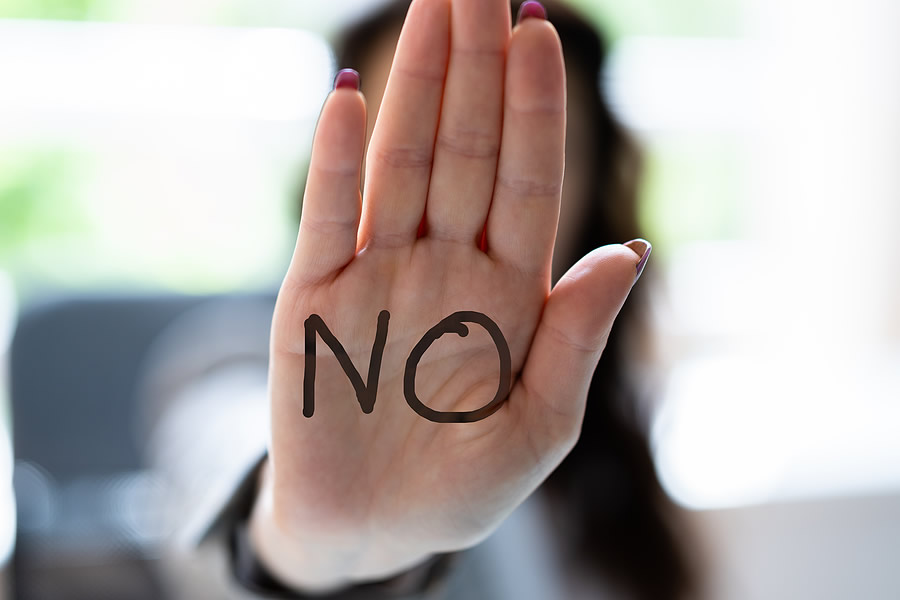
You’re finally ready to ask a prospective donor for a gift…
- You’ve prepared.
- You’ve practiced.
- You’ve overcome your fear of asking a donor for a gift.
So you make the ask, wait patiently for a response, and the person says, “No.”
Your heart sinks.
When a Donor Says “No”
How do you know when a donor says “no” that it really means “no” — as in “not ever”?
I tell my kids “no” all the time. Yet, it doesn’t stop them from asking me for something again, and again, and again. They do this for a variety of reasons — but mostly because they’ve learned that sometimes a “no” can turn into “yes,” particularly if they ask frequently and persistently enough.
So how come, as adults, we’re much more likely to take an initial no as a final no?
How to Turn a Donor’s “No” into a “Yes”
In fundraising, some of the best development directors are those who can take a “no” and turn it into a “yes.” So when you get a “no” for whatever reason, your job is to figure out why?
In other words, you need to get to the core reason and explore if there’s a way to turn that person’s “no” into “yes.” You might say something like:
I’m sorry to hear that. And I appreciate your time and attention. I’m wondering if you could tell me a bit more about what you had in mind?
Having language prepared to respond to “no” will help you turn things around in the long run.
Be Prepared For All Possible Answers
Before asking a prospective donor for a gift, you’ll want to consider all of their possible responses, so you’re prepared to respond appropriately no matter what they say.
In general, there are three types of response:
- Yes — woot!
- Maybe — almost there…
- No — drat.
In fundraising, “yes” and “maybe” are great answers, but “no” can make you cringe. But “no” isn’t as bad as you might think.
“No” is an opportunity to explore, build the relationship, ask more questions, and encourage donor engagement. It’s up to you to put on your detective’s cap and find out why the person is saying no — and how you can turn their no into a yes.
4 Reasons a Prospective Donor Might Say “No”
There are many reasons why a donor says no. Four of the most common include:
1. Wrong time.
Occasionally your ask will come at the wrong time. Normally the donor would give, but money is tight at the moment. Six months or a year from now might be better due to a change in the economy or their personal life.
2. Wrong project.
Sometimes it’s a matter of having asked for money for the wrong project. For example, they love your organization. They’re really interested in the after school program — but you asked for help with the preschool program.
3. Wrong amount.
It’s possible that you asked for too much or too little. Once you engage your donor with some good follow-up questions, you may be delighted to receive a gift of another amount.
4. Wrong asker.
This is often the most difficult issue to identify. It’s possible that your donor just doesn’t click with the board member you brought along. Keep your intuition tuned for issues like this, because they will often go unspoken.
Turning a ‘NO’ into a ‘YES’
One of my earliest mentors always said:
The best fundraisers are those who can turn no into yes.
As a fundraiser, you’ll absolutely hear some no’s during the course of your fundraising. If you don’t, you’re not asking nearly enough.
So the question then becomes how you’ll go about turning each ‘no’ into a ‘yes’. As a fundraiser, that takes careful probing, persistence, and experience. But I know you’ll get there!
Have you ever gotten a no and worked a little fundraising magic to turn it into a yes? I’d love to hear about it in the comments.

This is SO true. When I was trained as a field canvasser, we typically only took the third no, but that was cold-calling for much smaller gifts than I ask for today. I recently got a no for our major donor program and after probing a bit found out there were other similar groups this donor was already invested in, but that they truly appreciated what we were doing and how our work was different. I asked them to subscribe to our emails and the way we left things, I feel very comfortable asking again another time.